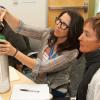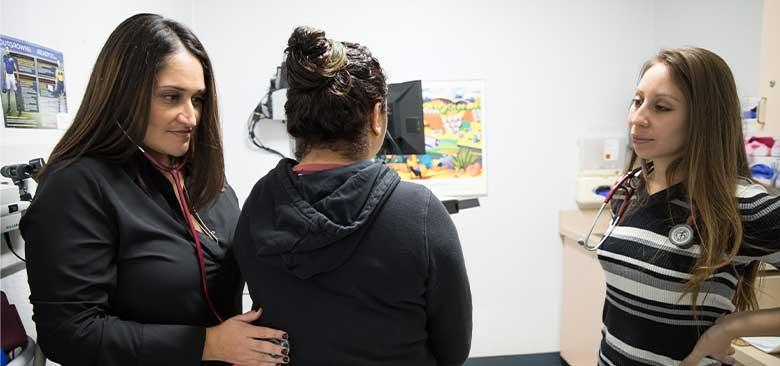
Through the School of Nursing's Rural Health concentration, Assistant Professor Elizabeth Castillo (left) is helping students learn about the barriers rural communities face and how to address them. (Photo credit: Elisabeth Fall)
The Pandemic Laid Bare Health Inequities. How We’re Preparing Future Nurse Leaders to Respond.
The COVID-19 pandemic has exposed fundamental flaws in the U.S. health care system, including stark health disparities for people of color and underserved populations.
To prepare future nurse leaders to address these challenges, the UCSF School of Nursing is blending hands-on clinical opportunities in underrepresented communities with a master’s curriculum that focuses on understanding and advancing health equity.
“This falls in line with our mission of improving access to care, especially to those communities that suffer from a lack of resources and access,” said assistant professor Elizabeth Castillo.
Providing Care in Rural Areas
Racial and ethnic minority groups have been at increased risk for COVID-19 due to a number of factors, including health care access, housing, structural racism and the fact that many are employed in essential industries. Health disparities stretch from rural areas to urban centers.
In rural communities, where there are fewer health care facilities, limited transportation options and depressed socioeconomic status, the arrival of the pandemic has exacerbated the health disparities. Educating residents about COVID-19 so they can protect themselves and those around them has been a challenge. For example, patients have reported losses of taste and smell — common symptoms of COVID-19 — yet they were unaware of the connection to the virus, Castillo said.
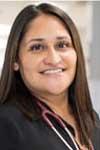 Elizabeth Castillo “With the lack of accessibility and resources for this population, things weren’t ideal before COVID,” said Castillo, who has been working in rural settings for 14 years. “COVID has added another layer to that.”
Elizabeth Castillo “With the lack of accessibility and resources for this population, things weren’t ideal before COVID,” said Castillo, who has been working in rural settings for 14 years. “COVID has added another layer to that.”
Nurse practitioner students at the School are learning the barriers that rural communities face, and acquiring the skills to address them. Through the Rural Health concentration that Castillo leads, students perform clinical rotations in rural areas throughout California, providing preventive care to residents and addressing chronic ailments such as diabetes and hypertension.
The students fulfill 80 hours of clinical work, and complete courses examining population health issues, social determinants of health and telehealth from a rural health perspective. They study common health problems among farmworkers, and the influence of socio-cultural factors and public policy on health systems. They also develop the knowledge and clinical assessment skills to treat opioid use disorder, a common problem in rural areas.
“You have to recognize the background of your patients to provide them with quality care,” she said. “We train our students to understand the risk factors of living in rural places such as geographic isolation, socioeconomic status and a lack of access to appropriate information — as well as the inequalities that result from those factors.”
Caring for Vulnerable Populations in Urban Centers
While rural areas have struggled during the pandemic, lower-income neighborhoods in urban centers have also been heavily impacted. Students at the School of Nursing have joined efforts to protect the health of these communities by taking to the streets to administer COVID-19 vaccines.
In San Francisco’s Tenderloin district, which has one of the city’s highest levels of poverty and homeless individuals, students work alongside clinicians and staff from UCSF Health, the 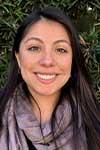 Gladys Partida Manzano San Francisco Department of Public Health, GLIDE and other organizations to form roving teams that administer free COVID-19 vaccinations to locals.
Gladys Partida Manzano San Francisco Department of Public Health, GLIDE and other organizations to form roving teams that administer free COVID-19 vaccinations to locals.
Gladys Partida Manzano, a student in the School’s Master’s Entry Program in Nursing (MEPN), joined the roving teams in October. Serving underserved populations is a passion for Partida Manzano, a daughter of Mexican immigrants.
“Coming from an underserved population, I’ve seen what health disparities can do to a community,” she said. “In the Tenderloin, you see a large, unhoused community, many with health complications that put their health at higher risk. I wanted to do my part.”
Partida Manzano estimates that her team administers about 30 to 40 vaccine doses during their weekly five-hour treks. They engage with passersby as well as small businesses. These roving teams have helped the Tenderloin achieve an estimated 88 percent vaccination rate as of October 2021.
Beyond the Tenderloin, students and clinicians have helped deliver testing and vaccines to other underrepresented populations in the San Francisco Bay Area.
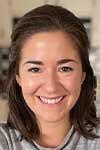 Laura Sanchez Among these have been aging adults who are unable to leave their homes due to a physical disability or dementia. Through UCSF’s Care at Home program, nursing students and clinical faculty members equipped with portable coolers containing the vaccine have visited patients in their homes to administer the vaccinations.
Laura Sanchez Among these have been aging adults who are unable to leave their homes due to a physical disability or dementia. Through UCSF’s Care at Home program, nursing students and clinical faculty members equipped with portable coolers containing the vaccine have visited patients in their homes to administer the vaccinations.
Alumna Laura Sanchez, who joined the effort as a master’s student, said, “Knowing that I played a role in providing vaccinations to some of the most vulnerable patients was incredibly rewarding. I gained a greater understanding of what goes into coordinating such a vaccination effort; it involved everything from carefully mapping out patients’ locations, meticulously tracking freezer temperatures, monitoring the time constantly, and so many other small but important details.”
Understanding the Needs of BIPOC and Underserved Communities
In addition to courses offered through the Rural Health Concentration, students explore social and structural barriers that underrepresented communities face through other courses in the School curriculum. These include:
- Racism, Health Care and Social Justice, which applies a broad structural lens accounting for racism’s historical role in influencing present-day health inequities.
- Global Community Health Planning and Interventions, which identifies potential health promotion opportunities and prevention problems in vulnerable communities, creates partnerships with community members and examines the deep roots of health problems.
- Advanced Concepts in Clinical Prevention and Population Health: Designed for DNP students, this course addresses health promotion and illness prevention with an emphasis on the impact of social determinants of health and health inequities in vulnerable populations.
- Occupational Health and Diverse Worker Populations, which examines the social and legal systems for occupational health as well as the social, cultural and economic factors influencing vulnerable workers.
- Professional Seminar in Health Policy: While focusing on health policy research and analysis, guest speakers discuss issues such as conducting research with homeless individuals, the LGBTQ+ community and other vulnerable populations.
Through these coursework and clinical experiences, students achieve the knowledge and skills to help address health disparities and advance positive change


